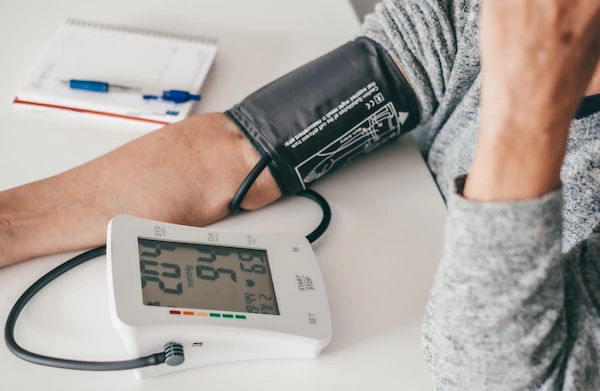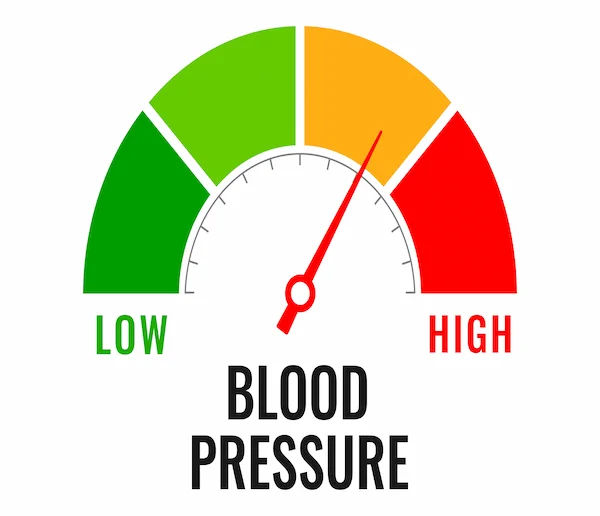High Blood Pressure: Your Guide to Risks, Side Effects, and Prevention
Know about the high blood pressure, risks, side effects, prevention, signs, symptoms and treatment options.

Written by Dr. J T Hema Pratima
Reviewed by Dr. Rohinipriyanka Pondugula MBBS
Last updated on 13th Jan, 2026

Introduction
High blood pressure, or hypertension, is often called the "silent killer" for a reason. Millions of people live with it every day, completely unaware of the immense strain it's putting on their arteries, heart, brain, and kidneys. You might feel perfectly fine, but internally, consistently high pressure is setting the stage for serious, life-altering health complications. This guide moves beyond the basic definition to explore the often-missed side effects and the severe long-term damage uncontrolled high blood pressure can cause. We'll break down what the numbers mean, the subtle signs your body might be sending you, and the comprehensive steps you can take from lifestyle adjustments to medical care to protect your health and significantly reduce your risk.
What Exactly is High Blood Pressure?
Imagine your blood vessels as a network of garden hoses. Your heart is the pump. High blood pressure is what happens when the force of the water (your blood) pushing against the walls of the hoses (your arteries) is consistently too high. This excessive force damages the delicate lining of the arteries, making them stiff, narrow, and prone to buildup—a process known as atherosclerosis.
Consult Top Specialists for Personalised Tips
Systolic vs. Diastolic: Understanding the Numbers
When you get a reading like 120/80 mmHg, you’re seeing two numbers:
Systolic Pressure (Top Number): This measures the pressure in your arteries when your heart beats and pumps blood out.
Diastolic Pressure (Bottom Number): This measures the pressure in your arteries when your heart is at rest between beats.
A reading of 130/80 mmHg or higher is generally considered stage 1 hypertension, warranting attention and likely lifestyle changes or medic
The Silent Symptoms: What Does High Blood Pressure Feel Like?
For most, hypertension is asymptomatic. However, when blood pressure reaches dangerously high levels, or if an individual is particularly sensitive, some may experience vague, often-dismissed signs.
Common Warning Signs You Might Ignore
These are not reliable for diagnosis, as they can be linked to countless other issues, but they can be a prompt to get checked:
Persistent headaches, often described as throbbing and occurring in the morning.
Nosebleeds without a clear cause.
Shortness of breath during mild exertion.
Dizziness or lightheadedness.
Chest pain or palpitations.
Visual changes like blurriness or seeing spots.
When "No Symptoms" is the Biggest Symptom
Relying on how you feel is a dangerous game. The absence of symptoms does not mean an absence of risk. The damage is often progressive and cumulative, making regular screening—at least once a year for adults—absolutely non-negotiable. If you experience any of these signs alongside risk factors, consult a doctor online with Apollo24|7 for further evaluation.
Beyond the Headache: Serious Complications of Uncontrolled Hypertension
This is the core of the issue. Long-term, unmanaged high blood pressure is the primary villain in a host of severe medical conditions.
Cardiovascular Damage: Your Heart Under Pressure
Your heart bears the brunt of the extra workload. Forcing it to pump against high pressure in the arteries causes the heart muscle to thicken and stiffen (left ventricular hypertrophy), eventually leading to inefficiency.
Heart Attack and Heart Failure
Damaged arteries are more likely to develop plaque. If a plaque ruptures, a clot can form, blocking blood flow to the heart muscle, causing a heart attack. The overworked heart can also simply wear out, leading to heart failure, where it can't pump enough blood to meet the body's needs.
Coronary Artery Disease
Narrowed arteries mean reduced blood flow to the heart itself, causing chest pain (angina) and increasing heart attack risk.
The Brain Attack: Stroke and Cognitive Decline
Hypertension is a leading cause of stroke. It can cause weakened arteries in the brain to burst (hemorrhagic stroke) or contribute to clots that block arteries (ischemic stroke). Even without a major stroke, reduced blood flow over time can lead to vascular dementia and mild cognitive impairment, affecting memory and thinking skills.
Kidney Damage: How Hypertension Harms Your Filters
Your kidneys are packed with tiny blood vessels that act as sophisticated filters. High pressure damages these vessels, rendering the kidneys unable to effectively filter waste from the blood. This can lead to kidney scarring and ultimately, kidney failure, requiring dialysis or a transplant. Apollo24|7 offers convenient home collection for tests like kidney function tests (e.g., creatinine, eGFR) to help monitor this risk.
Vision Loss: Hypertensive Retinopathy
The eyes have tiny, delicate blood vessels that are highly susceptible to pressure damage. Hypertension can cause these vessels to thicken, narrow, bleed, or leak, leading to a condition called hypertensive retinopathy. This can result in blurred vision, bleeding in the eye, and even complete vision loss.
Sexual Dysfunction: A Common but Unspoken Side Effect
In both men and women, healthy blood flow is essential for sexual function. Hypertension damages arteries throughout the body, including those supplying the genitals. This can lead to erectile dysfunction in men and reduced arousal and vaginal dryness in women.
Peripheral Artery Disease (PAD)
This condition involves a narrowing of arteries in the legs, arms, stomach, and head, leading to pain, cramping, numbness, and a higher risk of infection. In severe cases, it can lead to tissue death and amputation.
Hypertensive Crisis: A Medical Emergency
This is a severe and rapid increase in blood pressure—typically readings higher than 180/120 mmHg. It requires immediate emergency medical attention. Symptoms include severe headache, severe anxiety, shortness of breath, nosebleeds, and a feeling of impending doom. If you experience this, seek emergency care immediately.
Who is at Risk? Key Factors for Hypertension
Risk factors include age (risk increases over 65), family history, race (more common in people of African heritage), being overweight, a sedentary lifestyle, tobacco use, a high-sodium diet, low potassium intake, excessive alcohol consumption, and chronic stress. Certain chronic conditions, like diabetes and sleep apnea, also significantly increase risk.
Taking Control: How to Manage and Lower Your Blood Pressure
The excellent news is that hypertension is highly manageable, often without medication in the early stages.
Lifestyle Changes: Your First Line of Defense
This is the cornerstone of management:
DASH Diet: Embrace the Dietary Approaches to Stop Hypertension (DASH) diet, rich in fruits, vegetables, whole grains, and low-fat dairy.
Reduce Sodium: Aim for less than 1,500 mg per day. Avoid processed foods.
Regular Exercise: Aim for at least 150 minutes of moderate aerobic activity (brisk walking, cycling) per week.
Maintain a Healthy Weight: Losing even 5-10% of your body weight can have a major impact.
Limit Alcohol and Quit Smoking: Both are major contributors to blood pressure spikes and long-term damage.
Manage Stress: Techniques like meditation, deep breathing, and yoga can help lower stress.
Medications and Regular Monitoring
If lifestyle changes aren't enough, several effective classes of medications can help, such as ACE inhibitors, diuretics, or calcium channel blockers. If your condition does not improve after trying these methods, book a physical visit to a doctor with Apollo24|7 to create a tailored treatment plan. Home blood pressure monitors are invaluable tools for tracking your progress.
Conclusion
Living with high blood pressure doesn't have to be a sentence to poor health. While its potential complications are severe, they are also largely preventable. By understanding the risks, recognising the often-silent nature of the condition, and taking proactive steps through lifestyle modifications and regular medical care, you can powerfully influence your long-term health outcomes. This journey starts with a simple, painless test. Get your blood pressure checked, know your numbers, and have an open conversation with your healthcare provider. Taking control today can add vibrant, healthy years to your life tomorrow.
Consult Top Specialists
Consult Top Specialists for Personalised Tips

Dr. Tripti Deb
Cardiologist
40 Years • MBBS, MD, DM, FACC, FESC
Hyderabad
Apollo Hospitals Jubilee Hills, Hyderabad

Dr. Zulkarnain
General Physician
2 Years • MBBS, PGDM, FFM
Bengaluru
PRESTIGE SHANTHINIKETAN - SOCIETY CLINIC, Bengaluru

Dr. E Prabhakar Sastry
General Physician/ Internal Medicine Specialist
40 Years • MD(Internal Medicine)
Manikonda Jagir
Apollo Clinic, Manikonda, Manikonda Jagir
(150+ Patients)

Dr. Rakesh Gopal
Cardiologist
22 Years • “ Trained in Trans Aortic Valve Implantation ( TAVI ) from Mehmet Akif Ersoy Hospital Istanbul, Turkey “ & MD (General Medicine), FRCP (Glasglow)DNB( Cardiology), FESC, HICR Cert (Harvard University, USA), Angioplasty Training from Washington Adventist Hospital USA, Asan Medical Centre, Seoul Korea, Board certified in Cardio Oncology, ICOS- USA
Chennai
Apollo Hospitals Heart Centre Thousand Lights, Chennai
(100+ Patients)
Dr. Raman Puri
Cardiologist
29 Years • MD, DM
Delhi
Apollo Hospitals Indraprastha, Delhi
Consult Top Specialists

Dr. Tripti Deb
Cardiologist
40 Years • MBBS, MD, DM, FACC, FESC
Hyderabad
Apollo Hospitals Jubilee Hills, Hyderabad

Dr. Zulkarnain
General Physician
2 Years • MBBS, PGDM, FFM
Bengaluru
PRESTIGE SHANTHINIKETAN - SOCIETY CLINIC, Bengaluru

Dr. E Prabhakar Sastry
General Physician/ Internal Medicine Specialist
40 Years • MD(Internal Medicine)
Manikonda Jagir
Apollo Clinic, Manikonda, Manikonda Jagir
(150+ Patients)

Dr. Rakesh Gopal
Cardiologist
22 Years • “ Trained in Trans Aortic Valve Implantation ( TAVI ) from Mehmet Akif Ersoy Hospital Istanbul, Turkey “ & MD (General Medicine), FRCP (Glasglow)DNB( Cardiology), FESC, HICR Cert (Harvard University, USA), Angioplasty Training from Washington Adventist Hospital USA, Asan Medical Centre, Seoul Korea, Board certified in Cardio Oncology, ICOS- USA
Chennai
Apollo Hospitals Heart Centre Thousand Lights, Chennai
(100+ Patients)
Dr. Raman Puri
Cardiologist
29 Years • MD, DM
Delhi
Apollo Hospitals Indraprastha, Delhi
More articles from High Blood Pressure
Frequently Asked Questions
Can high blood pressure cause anxiety?
While anxiety can temporarily raise your blood pressure, there is no direct evidence that hypertension causes anxiety. However, the stress of being diagnosed with a chronic condition like hypertension can certainly lead to anxious feelings.
What is considered a dangerously high blood pressure level?
A reading above 180/120 mmHg is considered a hypertensive crisis and is dangerously high. This is a medical emergency, and you should seek immediate care.
Are there specific signs of high blood pressure in women?
The symptoms are generally the same for all genders. However, women may uniquely experience high blood pressure related to pregnancy (preeclampsia) or hormonal changes from birth control pills or menopause.
How can I lower my diastolic blood pressure specifically?
The same strategies that lower overall blood pressure—reducing sodium, exercising, managing weight, and limiting alcohol—will effectively lower both systolic and diastolic numbers. There isn't a way to target one independently through lifestyle.
If I get my blood pressure under control with medication, can I stop taking it?
No. Hypertension medication controls your blood pressure but does not cure it. Stopping medication will likely cause your levels to rise again. Always consult your doctor before making any changes to your prescription.




